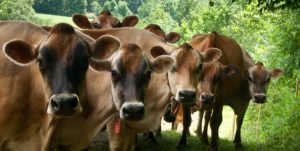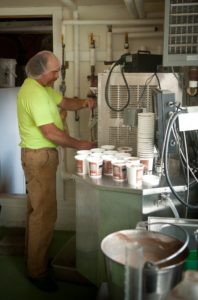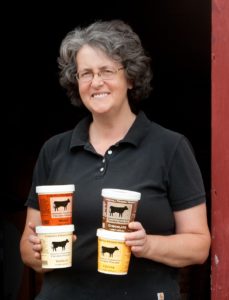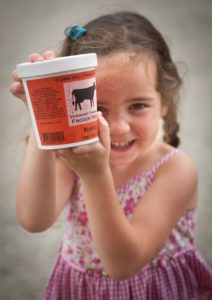Vermont Farmstead Frozen Yogurt Speeds Up Production with Slow Money
Vermont investors, capital providers and entrepreneurs connect at Slow Money Vermont events to boost local farm and food economies and communities.
by Rachel Carter
Creamy farmstead frozen yogurt in vanilla, chocolate, maple, and coffee flavors is pumped into 300 Cobb Hill Frozen Yogurt pints a week—a number that has more than doubled from this time last year.

The Jersey cow herd at Cedar Mountain Farm supply the milk for Cobb Hill Frozen Yogurt.
Credit: Robert Eddy
“A year ago, it took us three production days to do what we can now do in one,” exclaims Jeannine Kilbride, director and owner/partner of Cobb Hill Frozen Yogurt in Hartland, Vermont.
Last May, Kilbride presented at a Slow Money Vermont Entrepreneur Showcase event, making the case for a new batch freezer to double production of the artisanal frozen yogurt made in small batches from the milk of Jersey cows at Cedar Mountain Farm—also a part of the Cobb Hill community.
Cobb Hill
Cobb Hill is home to a co-housing community of 23 families who live and work on a 270-acre farm in Hartland, Vermont. Cobb Hill encompasses Cedar Mountain Farm—a cooperative dairy, produce, and meat farm; Cobb Hill Creamery—producers of Cobb Hill Cheese and Frozen Yogurt; as well as maple syrup, Shiitake mushroom, and Icelandic Sheep meat producers. All of the community enterprises located at Cobb Hill work together to create an ecologically sound and sustainable system for providing food for their families and the local community.
The co-housing model provides community members with use of the land, barn space and other materials, as well as tax breaks—all adding up to savings on production costs. Kilbride originally worked in the cheese making enterprise. She and partner Donn Cann made the decision to expand into yogurt as a way to specifically use as much milk as possible to support the farm model for the community.
“The low production costs allow us to pay a little more for the milk which enables the dairy farmers to make more,” Kilbride explains. Cobb Hill Frozen Yogurt is produced with non-homogenized whole milk from the Jersey cow herd at Cedar Mountain Farm. “Cobb Hill offers many value added opportunities— maple syrup is produced here that could be made into maple candies just like how we buy milk and make into frozen yogurt. And, we never have a shortage of milk if someone wanted to make more fresh cheese,” she adds.
Using economies-of-scale, Cobb Hill Frozen Yogurt is under contract to buy a certain amount of milk to sustain the poundage so the Cedar Mountain Farm dairy partners can be profitable and can continue to produce the milk needed to make value-added products like cheese and yogurt. This created the need for Cobb Hill Frozen Yogurt to increase production and efficiency and for that, they needed a batch freezer.
So, when Kilbride learned of the Slow Money Vermont Entrepreneur Showcase, she prepared and was selected to present to a group of investors and capital providers last May in White River Jct.
Avid Slow Money Vermont member, Vermont Community Loan Fund, was in the room and connected with Kilbride, resulting in a $13,050 loan for the new batch freezer, which has indeed doubled production and then some—300 pints a week compared to 140 per week a year ago. The loan also preserves one full-time job and opens the space for Kilbride to transition out of the cheese making business into frozen yogurt full-time.
Tips for Producers
As Cobb Hill Frozen Yogurt production has increased, Kilbride has learned a lot about product development—from ingredients and test batches to researching competition and packaging.
“It’s important to learn who to call for what you need to include on labeling in regards to the Food Safety Modernization Act (FSMA), non-GMO labeling, and nutritional labeling,” offers Kilbride. “The increase in regulation has added a lot of administrative time and costs that you need to prepare for.”
This summer, Cobb Hill Frozen Yogurt jumps from three to five distributors and anticipates a solid increase in sales—considering numbers have already doubled from last winter, prior to adding the two new distributors. Being proactive about the FSMA rules is serving to be paramount.
“We just jumped through a hoop getting a third party audit part of the food safety rules (FSMA) and received a passing grade and may now be able to enter into Whole Foods. Food businesses who are ahead of the curve may have more opportunity to get into new and expanding market channels,” says Kilbride. “It is important to try to set up your food safety plan first—before falling prey to the high prices companies solicit for food safety plan development. Audits are requested by stores or distributors so be prepared ahead of time by having a food safety plan intact.”
Another suggestion to producers—seek out financing opportunities that match your scale of production. If there is a Slow Money chapter in your region, get involved!
Slow Money
Slow Money is a way to connect farm and food enterprises with the investors in their communities to grow sustainable food economies. The fast money of Wall Street compromises healthy and resilient local economies, so socially-minded investors are taking their money elsewhere—to the farms and food businesses that nurture the communities where they live. While reshaping how investments are made in the food system takes time, the Slow Money movement is picking up speed in interest from investors. Investments being made in local and organic food enterprises across 46 states and seven countries are over $48 million since Slow Money began in 2009 with the publication of founder Woody Tasch’s book, Inquiries into the Nature of Slow Money (Chelsea Green).
In the Northeast, Slow Money chapters include Maine, NYC, two in Massachusetts (Boston and Pioneer Valley), and the newly formed Slow Money Vermont—developed through a task force connected to Vermont’s Farm to Plate food system plan. Slow Money Vermont is helping Vermont reach its Farm to Plate goals to increase investments and financial partnerships in food system enterprises.
Slow Money Vermont recently launched the Vermont Food Investors Network to help investors and entrepreneurs develop local food investments through networking and online partnerships with Milk Money Vermont. Up next for Slow Money Vermont organizers is to hold another Entrepreneur Showcase to continue to connect food businesses with capital providers and investors, and to host the 2016 Slow Money Regional Gathering.
Rachel Carter is the communications director at the Vermont Sustainable Jobs Fund, a non-profit organization created by the State of Vermont to help develop Vermont’s sustainable agriculture, renewable energy, and forest product businesses. She can be reached at 802-318-5527 or rachel@vsjf.org.
For more information:
Cobb Hill Co-Housing http://www.cobbhill.org/
Milk Money Vermont http://milkmoneyvt.com/
Slow Money https://slowmoney.org/
Slow Money Boston http://slowmoneyboston.org/
Slow Money Maine http://www.slowmoneymaine.org/
Slow Money NYC http://slowmoneynyc.org/
Slow Money Pioneer Valley (MA) http://www.pvgrows.net/working-groups/working-group-slow-money-pv-chapter/
Slow Money Vermont https://www.facebook.com/SlowMoneyVermont/
Vermont Community Loan Fund http://www.investinvermont.org/
Vermont Farm to Plate http://www.vtfarmtoplate.com/




